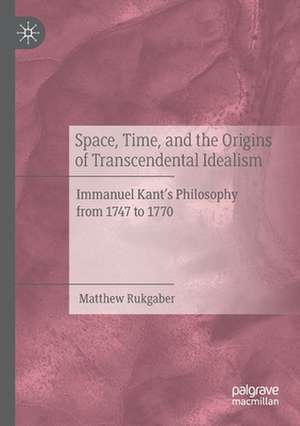Space, Time, and the Origins of Transcendental Idealism: Immanuel Kant’s Philosophy from 1747 to 1770
Autor Matthew Rukgaberen Limba Engleză Paperback – 22 noi 2021
| Toate formatele și edițiile | Preț | Express |
|---|---|---|
| Paperback (1) | 695.85 lei 6-8 săpt. | |
| Springer International Publishing – 22 noi 2021 | 695.85 lei 6-8 săpt. | |
| Hardback (1) | 700.10 lei 6-8 săpt. | |
| Springer International Publishing – 22 noi 2020 | 700.10 lei 6-8 săpt. |
Preț: 695.85 lei
Preț vechi: 818.64 lei
-15% Nou
Puncte Express: 1044
Preț estimativ în valută:
133.18€ • 138.50$ • 111.44£
133.18€ • 138.50$ • 111.44£
Carte tipărită la comandă
Livrare economică 14-28 martie
Preluare comenzi: 021 569.72.76
Specificații
ISBN-13: 9783030607449
ISBN-10: 3030607445
Pagini: 284
Ilustrații: XII, 284 p.
Dimensiuni: 148 x 210 mm
Greutate: 0.39 kg
Ediția:1st ed. 2020
Editura: Springer International Publishing
Colecția Palgrave Macmillan
Locul publicării:Cham, Switzerland
ISBN-10: 3030607445
Pagini: 284
Ilustrații: XII, 284 p.
Dimensiuni: 148 x 210 mm
Greutate: 0.39 kg
Ediția:1st ed. 2020
Editura: Springer International Publishing
Colecția Palgrave Macmillan
Locul publicării:Cham, Switzerland
Cuprins
1. Introduction: An Overview of the Metaphysics of the Pre-Critical and Critical Kant.- 2. Space, Force, and Matter in the Early Natural Science Writings.- 3. Substances, Space, and Causality in the Early Metaphysical Writings.- 4. The Development of Kant’s Pre-Critical Metaphysics from 1758 to 1766.- 5. The Asymmetry of Space: Kant’s Theory of Absolute Space in 1768.- 6. The Moment of Transformation: Time and the Critical Turn in the Inaugural Dissertation.- 7. Kant’s Theory of Space in the Inaugural Dissertation and the Birth of Transcendental Idealism.
Notă biografică
Matthew Rukgaber teaches at Eastern Connecticut State University and Gateway Community College, USA.
Textul de pe ultima copertă
This book provides an account of the unity of Immanuel Kant’s early metaphysics, including the moment he invents transcendental idealism. Matthew Rukgaber argues that a division between “two worlds”—the world of matter, force, and space on the one hand, and the world of metaphysical substances with inner states and principles preserved by God on the other—is what guides Kant’s thought. Until 1770 Kant consistently held a conception of space as a force-based material product of monads that are only virtually present in nature. As Rukgaber explains, transcendental idealism emerges as a constructivist metaphysics, a view in which space and time are real relations outside of the mind, but those relations are metaphysically dependent on the subject. The subject creates the simple “now” and “here,” thus introducing into the intrinsically indeterminate and infinitely divisible continua of nature a metric with transformation rules that make possible all individuation and measurement.
Caracteristici
Provides a novel approach to Kant pre-Critical and Critical metaphysics Fills important lacunae in the English-language literature on the pre-Critical writings and on Kant’s entire philosophy of space and time Offers a textually compelling narrative that engages Kant’s physics and metaphysics
